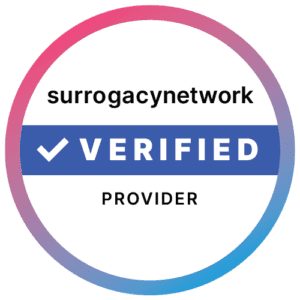Surrogacy is a life-changing experience for intended parents and surrogates alike. The key to a successful surrogacy journey is open communication and strong trust and understanding between the surrogate and intended parents. This means being transparent about your expectations, limitations, and concerns. It also means being a good listener and showing empathy towards the intended parents, being available to answer questions, provide updates, and ask for help when needed.
By asking thoughtful and thorough questions and establishing clear expectations from the outset, you can help ensure a positive and fulfilling experience for all involved. Sometimes it’s hard to come up with what to say to the intended parent, so here’s a guide to help you establish open and effective communication.
GET TO KNOW INTENDED PARENTS

When it comes to surrogacy, it’s essential to have a thorough understanding of the intended parents‘ expectations and preferences. As a surrogate, it’s your responsibility to ask the right questions to ensure that you’re a good match for each other. But what exactly should you ask?
Background & Lifestyle
The foundation of a successful relationship is connecting on a personal level. Learning about the intended parents’ background and lifestyle will give you a better sense of their personalities, beliefs, and expectations. Asking about their hobbies, interests, and lifestyle choices will help you gain a better understanding of their preferences.
Why Surrogacy?
You should ask about their reasons for pursuing surrogacy. Whether it’s due to infertility or other medical reasons, understanding their motivation can help you better support them during the surrogacy process.
Pregnancy & Birth Expectations
It’s important to discuss the intended parents’ expectations for the pregnancy and birth. This can include everything from dietary restrictions to their desired level of involvement in the birthing process. You may also want to discuss any potential medical concerns or complications that could arise during the pregnancy, as well as the intended parents’ preferred course of action in these scenarios.
Legal & Financial Aspects
Money and Legal conversations typically have no place at the dinner table. Still, it’s essential to understand the legal requirements and financial responsibilities, including any potential medical expenses, insurance coverage, and compensation arrangements. This can guarantee that everyone is on the same page and that there won’t be any future misunderstandings or surprises.
STAYING CONNECTED WITH INTENDED PARENTS

Establishing a communication plan with the intended parents early on in the process is important. They want to feel connected to you and the baby throughout the surrogacy. It reassures them that you’re taking care of yourself and the baby and that they are in good hands.
Some of the things intended parents want to hear are:
- Regular updates on the baby’s health and development
- How are you feeling? How the pregnancy is progressing
- Any challenges or concerns that arise
- How the intended parents can support you
You can include these in weekly or bi-weekly updates, phone calls, and in-person meetings. The more connected the intended parents feel to you and the baby, the smoother the journey. Remember, there’s no such thing as “too much communication!”
Sharing updates and milestones
Sharing updates and milestones is an important and joyful part of the pregnancy and surrogacy journey. It helps intended parents feel connected to you and the baby and keeps them informed about the pregnancy’s progress. Here are some updates and meaningful milestones to share:
- Ultrasound photos and videos
- Baby’s weight and size – are they a peanut, a grapefruit, a watermelon?
- Baby’s first kicks and movements
- Important medical appointments and tests
Every intended parent is different. Some may want daily updates, while others may prefer weekly. Establishing what they want to hear and when is important from the very beginning to ensure they feel connected and are a part of the baby’s development.
Discussing difficult topics

The surrogacy journey is just that – a journey. It’s filled with emotions, uncertainties, and challenges. It can be filled with many highs and, while unexpected, potential lows that may require a difficult conversation. Whether it’s a complication or a further test is required, it’s important to approach these conversations with the intended parents with compassion and understanding. Some of the difficult topics that may need to be discussed include:
- Birth plan preferences
- Medical complications
- Pregnancy loss
It’s important to establish a safe and non-judgmental space for these conversations. This means being an active listener and allowing the intended parents to express their concerns and preferences. It’s also important to be transparent about your own thoughts and feelings.
Tips for effective communication
Effective communication is key to a successful surrogacy journey. Here are some tips for communicating effectively with intended parents:
- Be transparent about your expectations, limitations, and concerns
- Establish a communication strategy from the very beginning
- Be open, timely, and honest about any challenges or concerns that arise
- Listen actively and show empathy toward the intended parents
- Celebrate milestones and achievements together
Common challenges and how to overcome them
The surrogacy journey can be filled with challenges and uncertainties. Some of the common challenges that may arise include:
- Medical complications
- Legal issues
- Emotional stress
It’s important to approach these challenges with a positive and proactive attitude. This means being open and honest about any concerns or issues that arise and working together to find solutions.
Resources for support and guidance
Many resources are available for surrogates and intended parents throughout the surrogacy journey. These resources can provide valuable support and guidance and help alleviate any stress or concerns. Some of the resources available include:
It’s important to take advantage of these resources and share them with the intended parents when needed.
Conclusion: The power of open and honest communication in surrogacy
Good communication is key to a healthy relationship. It’s important to establish open and honest communication from the very beginning and to maintain it throughout the process. By knowing what to say to intended parents, sharing updates, discussing difficult topics openly, and providing emotional support, you can create a positive and successful surrogacy journey for everyone involved. Remember, the more connected you feel to the intended parents and the baby, the smoother the journey will be.




